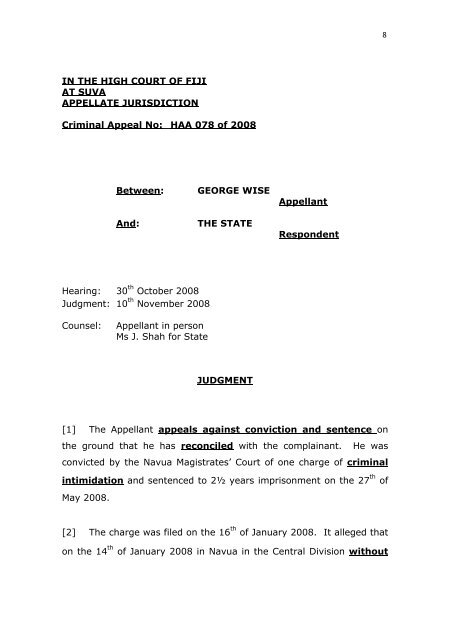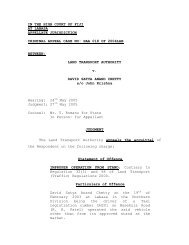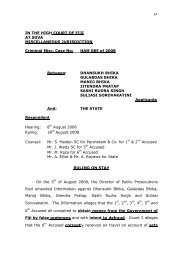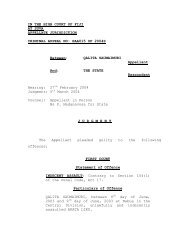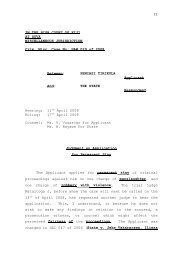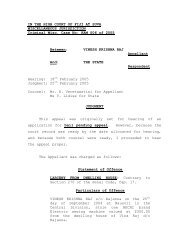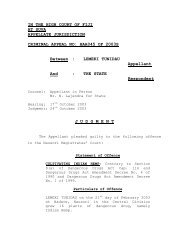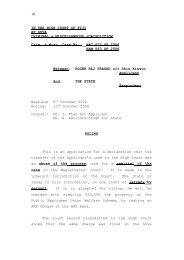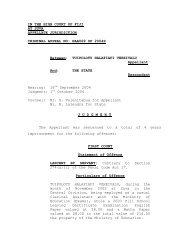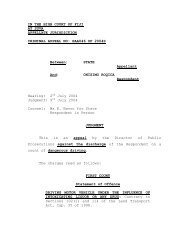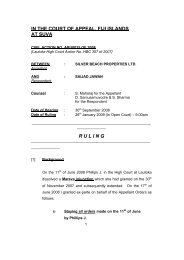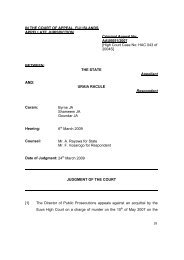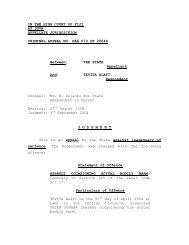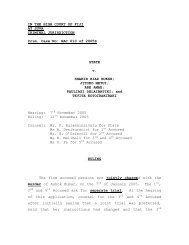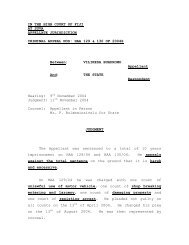George Wise v State HAA078J.08S - Law Fiji
George Wise v State HAA078J.08S - Law Fiji
George Wise v State HAA078J.08S - Law Fiji
Create successful ePaper yourself
Turn your PDF publications into a flip-book with our unique Google optimized e-Paper software.
8<br />
IN THE HIGH COURT OF FIJI<br />
AT SUVA<br />
APPELLATE JURISDICTION<br />
Criminal Appeal No: HAA 078 of 2008<br />
Between:<br />
And:<br />
GEORGE WISE<br />
THE STATE<br />
Appellant<br />
Respondent<br />
Hearing: 30 th October 2008<br />
Judgment: 10 th November 2008<br />
Counsel:<br />
Appellant in person<br />
Ms J. Shah for <strong>State</strong><br />
JUDGMENT<br />
[1] The Appellant appeals against conviction and sentence on<br />
the ground that he has reconciled with the complainant. He was<br />
convicted by the Navua Magistrates’ Court of one charge of criminal<br />
intimidation and sentenced to 2½ years imprisonment on the 27 th of<br />
May 2008.<br />
[2] The charge was filed on the 16 th of January 2008. It alleged that<br />
on the 14 th of January 2008 in Navua in the Central Division without
8<br />
lawful excuse and with intent to cause alarm threatened Grace<br />
<strong>Wise</strong> in words to cause injury to her person.<br />
[3] The case was called on the 16 th of January 2008. He was told of<br />
his right to counsel and he asked for a lawyer. The prosecution asked<br />
for him to be mentally assessed at St. Giles Psychiatric Hospital. He<br />
said he was suffering from a “serious illness.” The Appellant remained<br />
in remand. On the 6 th of February the Hospital had not conducted the<br />
examination.<br />
[4] The report was finally provided on the 18 th of February 2008. It<br />
stated that he was aware of his actions, and that he was able to<br />
participate fully in court proceedings. He was then granted bail and<br />
was given time to instruct counsel. On the 18 th<br />
of March 2008 he<br />
waived his right to counsel and pleaded not guilty.<br />
[5] The trial proceeded on the 16 th of April 2008. The evidence of<br />
Grace <strong>Wise</strong>, the Appellant’s sister, was that she was at her family<br />
home at Wainividivo on the 14 th of January at 8pm when the Appellant<br />
began to verbally abuse her. He swore, threatened to kill her by<br />
burning her inside her bedroom and called her a prostitute and bitch.<br />
He punched and kicked the wall of her bedroom where she had locked<br />
herself, for over an hour. She said that the Appellant always wanted<br />
the house to himself, that he would smoke cannabis there with his<br />
friends and that he had behaved in this way previously. The witness’s<br />
boyfriend came home at 9pm and persuaded her to report the matter<br />
to the police.<br />
[6] In cross-examination the Appellant asked the witness whether
8<br />
she had reported him to the police for selling marijuana and suggested<br />
that he had smoked marijuana and not sold it. This line of<br />
cross-examination appears then to have been stopped by the learned<br />
Magistrate. The Appellant then put to the witness that he had never<br />
threatened her but she maintained her position.<br />
[7] Giving evidence next was Police Constable Adrian Simmons who<br />
interviewed the Appellant under caution. The Appellant did not object<br />
to the tendering of his interview. In it he denied saying anything to<br />
her, saying that he had been lying down reading the Bible.<br />
[8] The Appellant gave sworn evidence. He said he had never<br />
threatened his sister, that he was angry with her for reporting him to<br />
the police, that he had been arrested and convicted for possession of<br />
marijuana and not for selling and that the conviction had cost him his<br />
job. She had reported him in 2006 and he had been angry with her<br />
since then.<br />
[9] Judgment was delivered on the 13 th of May 2008. The learned<br />
Magistrate directed herself on the burden of proof and said that the<br />
case depended on the evidence of Grace <strong>Wise</strong>. She accepted her<br />
evidence and found some support from the admission of the Appellant<br />
that he had been angry with her since 2006. She convicted the<br />
Appellant.<br />
[10] Sentence was imposed on the 27 th of May 2008. She considered<br />
Kelemedi Lagi and Others v. The <strong>State</strong> HAA 004/2004S and<br />
commenced at 2 years imprisonment. She considered the mitigation,<br />
the Appellant’s career in engineering, his employment and his studies.<br />
She sentenced him to 2½ years imprisonment.
8<br />
[11] The Appellant’s main ground of appeal against both conviction<br />
and sentence is that he has reconciled with his sister, and that this is<br />
a family matter which was not the concern of the courts. His sister<br />
came to court to confirm reconciliation and said that this had occurred<br />
since his sentence was passed.<br />
[12] The <strong>State</strong> opposes this ground of appeal saying that criminal<br />
intimidation is not a reconcilable offence, that even if it was a family<br />
dispute, reconciliation usually failed to take into account the weaker<br />
bargaining position of women in the household, and that the 2½ term<br />
of imprisonment was correct in principle.<br />
[13] The appeal against conviction must fail. Reconciliation was not<br />
an issue at trial, either in fact or in principle. The Appellant had not<br />
reconciled with his sister at the trial and his anger with her was<br />
obvious to the trial magistrate. It was a contributing factor to the<br />
finding of guilt. Even if they had reconciled, the offence of criminal<br />
intimidation, contrary to section 330(a) of the Penal Code, is not an<br />
offence listed in section 163 of the Criminal Procedure Code as an<br />
offence for which reconciliation should be promoted. Section 330 is<br />
not a reconcilable offence.<br />
[14] Although the issue of disclosure of his previous convictions was<br />
not a ground of appeal, I consider that I should deal with it because<br />
the Appellant is unrepresented. The issue of the Appellant’s<br />
experience with drugs, and of his previous conviction for possessing<br />
drugs arose from the Appellant’s own cross-examination. He clearly<br />
disclosed the information to prove that his sister had a history of<br />
hostility towards him, thus leading her to make a false complaint.
8<br />
Sadly for him, the “defence” was just as capable of strengthening the<br />
prosecution case by becoming proof of anger towards his sister.<br />
Nevertheless it was the Accused himself who brought up the issue,<br />
firstly in cross-examination of Grace <strong>Wise</strong>, and secondly during his own<br />
sworn evidence.<br />
[15] The learned Magistrate appears to have given the issue only<br />
cursory attention, relying on it to find that the Appellant was angry<br />
with his sister. It was evidence of motive, which was relevant to the<br />
case. There is no evidence that the Appellant was prejudiced by it or<br />
that the learned Magistrate relied on the evidence of the previous<br />
conviction to find guilt in this case. It might have been preferable for<br />
the learned Magistrate to say in her judgment that she “warned herself<br />
to disregard the evidence of character in considering the Accused’s<br />
guilt” but I find no suggestion that she relied upon that evidence in any<br />
other way other than to find motive.<br />
[16] The appeal against conviction is dismissed.<br />
[17] In her sentencing remarks, the learned Magistrate said that<br />
although the offence of criminal intimidation had no tariff set by<br />
guideline judgments, she would rely on the decision of Kelemedi Lagi<br />
and Others v. The <strong>State</strong> HAA0004 of 2004S, a case of arson and<br />
criminal intimidation. In that case the Accused had been convicted of,<br />
inter alia, criminal intimidation for gathering outside the house of a<br />
fellow villager, armed with sticks and spear guns, and for banging the<br />
walls and saying that the house would be burnt. The Accused were<br />
sentenced to two years imprisonment. In that case, I said:<br />
“Similarly, in respect of the offence of criminal<br />
intimidation, the maximum sentence is 10 years
8<br />
imprisonment because the “threat’ was to burn<br />
the house. The Respondents acted as a group<br />
to put fear into the occupants of the house.<br />
The occupants included men, women and<br />
children. Committed in the middle of the night,<br />
and involving the use of dangerous weapons,<br />
the offence called for a deterrent sentence.”<br />
[18] In this case the Appellant acted alone, and although he too<br />
threatened to burn the house down, his was not a case of group<br />
threats of violence. I consider that the starting point should have been<br />
12 months imprisonment. Aggravating factors were the prolonged<br />
nature of the intimidation, the level of abuse, the violence to the walls<br />
and door of the victim’s bedroom and the lack of any regret or<br />
remorse.<br />
[19] Mitigating factors were his difficult relationship with his sister, his<br />
employment history, his educational endeavours and the lack of any<br />
physical harm. He is not a first offender. He has previous convictions<br />
for assault (in 1998), damaging property (in 2000 and 2006) and<br />
resisting arrest (2007). He was not entitled to the special leniency<br />
given to first offenders.<br />
[20] The Appellant submitted that this is a family dispute and that this<br />
was a mitigating factor. I do not agree. The fact that an assault, or<br />
threats of assault occur within a family home, does not make it any<br />
less a criminal offence. To suggest otherwise would be to give those<br />
who hold positions of power and authority within the home, virtual<br />
impunity from prosecution and punishment. A criminal offence is an<br />
offence whether it is committed on the street on strangers, or in the<br />
home on one’s own family members. Indeed it may be said that<br />
offences committed on family members should be considered very
8<br />
seriously by the courts because of the gross betrayal of trust<br />
perpetrated on those family members.<br />
[21] The courts must also be aware that offenders may escape justice<br />
because their victims are emotionally and financially dependent on<br />
them, and can easily be persuaded to reconcile and withdraw their<br />
complaints. Reconciliation is a positive feature of justice, but it must<br />
be effected from an equal bargaining position.<br />
[22] In this case the <strong>State</strong> suggested that there was no such equality<br />
of bargaining position, and referring to decisions of the High Court<br />
on reconciliation and sentencing (Khan v. The <strong>State</strong> [2002]<br />
HAM0049D.2002S, Pal v. The <strong>State</strong> [2005] HAA 0092J.2005S, <strong>State</strong><br />
v. Naitokarua [1994] HAM 0006t) submitted that the victim was in a<br />
weak position in relation to reconciliation.<br />
[23] Having seen the complainant myself, I do not consider this to be<br />
the case. It appears that she has made amends with her brother out<br />
of genuine compassion and has been visiting him in prison. However I<br />
also consider that her forgiveness of him arose from her knowledge<br />
that the Appellant has been punished by the courts. Justice has<br />
ensured reconciliation.<br />
[24] If this evidence had been before the learned Magistrate, it would<br />
have reflected on sentence. However it was not, and I cannot consider<br />
it at appellate stage.<br />
[25] I do however consider that the 2½ year was in excess of the<br />
appropriate sentence for this case, and on a starting point of 12<br />
months imprisonment the correct sentence should have been 18
8<br />
months imprisonment. The circumstances are less serious than in the<br />
Lagi case.<br />
[26] The appeal against sentence is allowed and sentence is<br />
reduced to 18 months imprisonment.<br />
Nazhat Shameem<br />
JUDGE<br />
At Suva<br />
10 th November 2008


